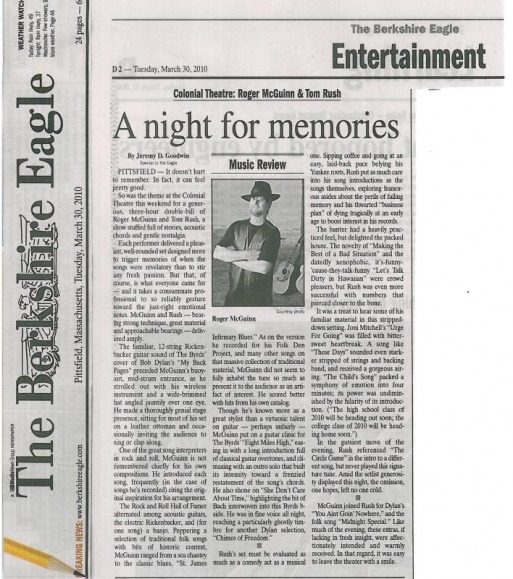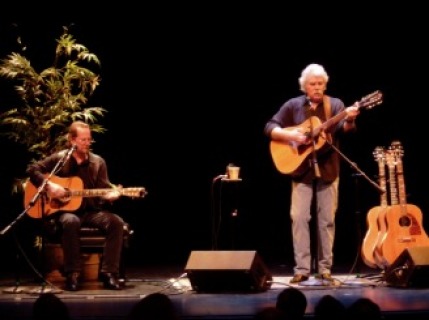"A night for memories"
Published in the Berkshire Eagle, 3/30/10

By Jeremy D. Goodwin
PITTSFIELD—It doesn’t hurt to remember. In fact, it can feel pretty good.
So was the theme at the Colonial Theatre this weekend for a generous, three-hour double-bill of Roger McGuinn and Tom Rush, a show stuffed full of stories, acoustic chords and gentle nostalgia.
Each performer delivered a pleasant, well-rounded set designed more to trigger memories of when the songs were revelatory than to stir any fresh passion. But that, of course, is what everyone came for—and it takes a consummate professional to so reliably gesture toward the just-right emotional notes. McGuinn and Rush—bearing strong technique, great material and approachable bearings—delivered amply.
The familiar, 12-string Rickenbacker guitar sound of The Byrds’ cover of Bob Dylan’s “My Back Pages” preceded McGuinn’s buoyant, mid-strum entrance, as he strolled out with his wireless instrument and a wide-brimmed hat angled jauntily over one eye. He made a thoroughly genial stage presence, sitting for most of his set on a leather ottoman and occasionally inviting the audience to sing or clap along.
One of the great song interpreters in rock and roll, McGuinn is not remembered chiefly for his own compositions. He introduced each song, frequently (in the case of songs he’s recorded) citing the original inspiration for his arrangement. The Rock and Roll Hall of Famer alternated among acoustic guitars, the electric Rickenbacker, and (for one song) a banjo. Peppering a selection of traditional folk songs with bits of historic context, McGuinn ranged from a sea chantey to the classic blues “St. James Infirmary Blues.” As on the version he recorded for his Folk Den Project, and many other songs on that massive collection of traditional material, McGuinn did not seem to fully inhabit the tune so much as present it to the audience as an artifact of interest. He scored better with hits from his own catalog.

Blurry photo by JDG
Though he’s known more as a great stylist than a virtuosic talent on guitar—perhaps unfairly—McGuinn put on a guitar clinic for The Byrds’ “Eight Miles High,” easing in with a long introduction full of classical guitar overtones, and climaxing with an outro solo that built its intensity toward a frenzied restatement of the song’s chords. He also shone on “She Don’t Care About Time,” highlighting the bit of Bach interwoven into this Byrds b-side. He was in fine voice all night, reaching a particularly ghostly timbre for another Dylan selection, “Chimes of Freedom.”
Rush’s set must be evaluated as much as a comedy act as a musical one. Sipping coffee and going at an easy, laid-back pace belying his Yankee roots, Rush put as much care into his song introductions as the songs themselves, exploring humorous asides about the perils of failing memory and his thwarted “business plan” of dying tragically at an early age to boost interest in his records.
The banter had a heavily practiced feel, but delighted the packed house. The novelty of “Making the Best of a Bad Situation” and the datedly xenophobic, it’s-funny-‘cause-they-talk-funny “Let’s Talk Dirty in Hawaiian” were crowd pleasers, but Rush was even more successful with numbers that pierced closer to the bone.
It was a treat to hear some of his familiar material in this stripped-down setting. Joni Mitchell’s “Urge For Going” was filled with bittersweet heartbreak. A song like “These Days” sounded even starker stripped of strings and backing band, and received a gorgeous airing. “The Child’s Song” packed a symphony of emotion into four minutes; its power was undiminished by the hilarity of its introduction. (“The high school class of 2010 will be heading out soon; the college class of 2010 will be heading home soon.”)
In the gutsiest move of the evening, Rush referenced “The Circle Game” in the intro to a different song, but never played this signature tune. Amid the setlist generosity displayed this night, the omission hopefully left no one cold.
McGuinn joined Rush for Dylan’s “You Aint Goin’ Nowhere” and the folk song “Midnight Special.” Like much of the evening, these extras, if lacking in fresh insight, were affectionately intended and warmly received. In that regard, it was easy to leave the theatre with a smile.
Rush’s set must be evaluated as much as a comedy act as a musical one. Sipping coffee and going at an easy, laid-back pace belying his Yankee roots, Rush put as much care into his song introductions as the songs themselves, exploring humorous asides about the perils of failing memory and his thwarted “business plan” of dying tragically at an early age to boost interest in his records.
The banter had a heavily practiced feel, but delighted the packed house. The novelty of “Making the Best of a Bad Situation” and the datedly xenophobic, it’s-funny-‘cause-they-talk-funny “Let’s Talk Dirty in Hawaiian” were crowd pleasers, but Rush was even more successful with numbers that pierced closer to the bone.
It was a treat to hear some of his familiar material in this stripped-down setting. Joni Mitchell’s “Urge For Going” was filled with bittersweet heartbreak. A song like “These Days” sounded even starker stripped of strings and backing band, and received a gorgeous airing. “The Child’s Song” packed a symphony of emotion into four minutes; its power was undiminished by the hilarity of its introduction. (“The high school class of 2010 will be heading out soon; the college class of 2010 will be heading home soon.”)
In the gutsiest move of the evening, Rush referenced “The Circle Game” in the intro to a different song, but never played this signature tune. Amid the setlist generosity displayed this night, the omission hopefully left no one cold.
McGuinn joined Rush for Dylan’s “You Aint Goin’ Nowhere” and the folk song “Midnight Special.” Like much of the evening, these extras, if lacking in fresh insight, were affectionately intended and warmly received. In that regard, it was easy to leave the theatre with a smile.
